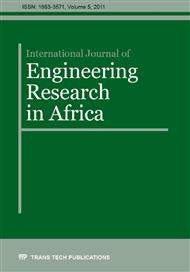[1]
S.M. Johnson, Optimal two- and three- stage production schedule with setup times included, Naval Research Logistics, 1 (1954) 61-68.
DOI: 10.1002/nav.3800010110
Google Scholar
[2]
C. L. Chen, R.L. Bulfin, Complexity of single machine, multi-criteria scheduling problems, European Journal of Operational Research, 70 (1993) 115-125.
DOI: 10.1016/0377-2217(93)90236-g
Google Scholar
[3]
M. Ehrgott, X. Grandibleux, An Annotated Bibliography of Multiobjective Combinatorial Optimization, Report in Wirtschaftsmathematik, No. 62, Fachbereich Mathematik - Universitat Kaiserslautern, (2000).
Google Scholar
[4]
S. French, Sequencing and Scheduling. Ellis Horwood Limited, Chichester, (1982).
Google Scholar
[5]
A. Nagar, J. Haddock, S. Heragu, Multiple and bicriteria scheduling: A literature survey, European Journal of Operational Research, 81 (1995) 88-104.
DOI: 10.1016/0377-2217(93)e0140-s
Google Scholar
[6]
R. Mazzini, V.A. Armentano, A heuristic for single machine scheduling with early and tardy costs, European Journal of Operational Research, 128 (2001) 129-146.
DOI: 10.1016/s0377-2217(99)00345-8
Google Scholar
[7]
H. Chen, C. Chu, J. M. Proth, A branch and bound approach for earliness-tardiness scheduling problems with different due dates, Institut National de Recherche en Informatique et en Automatique (INRIA) Research Report, (1995).
DOI: 10.1007/978-3-642-80117-4_24
Google Scholar
[8]
G . Wan, B. P.C. Yen, Tabu search for single machine scheduling with distinct due windows and weighted earliness/tardiness penalties, European Journal of Operational Research, 142 (2002) 271–281.
DOI: 10.1016/s0377-2217(01)00302-2
Google Scholar
[9]
F. Sourd, Punctuality and idleness in Just-In-Time scheduling, European Journal of Operational Research, 167 (2005) 739–751.
DOI: 10.1016/j.ejor.2004.07.018
Google Scholar
[10]
V.A. Armentano, M. F. Franca Filho, Minimizing total tardiness in parallel machine scheduling with setup times: An adaptive memory-based GRASP approach, European Journal of Operational Research, 183 (2007) 100–114.
DOI: 10.1016/j.ejor.2006.09.077
Google Scholar
[11]
J. E. Schaller, J.N.D. Gupta, Single machine scheduling with family setups to minimize total earliness and tardiness, European Journal of Operational Research, 187 (2008) 1050–1068.
DOI: 10.1016/j.ejor.2006.06.061
Google Scholar
[12]
G. Wan, B. P.C. Yen, Single machine scheduling to minimize total weighted earliness subject to minimal number of tardy jobs, European Journal of Operational Research, 195 (2009) 89-97.
DOI: 10.1016/j.ejor.2008.01.029
Google Scholar
[13]
S.S. Panwalkar, M.L. Smith, A. Seidmann, Common due date assignment to minimize total penalty for the one machine scheduling problem, Operations Research, 30 (1982) 391-399.
DOI: 10.1287/opre.30.2.391
Google Scholar
[14]
P. Dileepan, Common due date scheduling problem with separate earliness and tardiness penalties, Computers Operations Research, 20 (1993) 179-184.
DOI: 10.1016/0305-0548(93)90073-r
Google Scholar
[15]
Z.L. Chen, Scheduling with batch setup times and earliness-tardiness penalties, European Journal of Operational Research, 96 (1997) 518-537.
DOI: 10.1016/s0377-2217(96)00096-3
Google Scholar
[16]
S. W. Lin, S. Y. Chou, K. C. Ying, A sequential exchange approach for minimizing earliness–tardiness penalties of single-machine scheduling with a common due date, European Journal of Operational Research, 177 (2007) 1294–1301.
DOI: 10.1016/j.ejor.2005.11.015
Google Scholar
[17]
G. M. Magableh, S.J. Mason, Minimizing earliness and tardiness on parallel machines with sequence-dependent setups, International Journal of Operational Research, 8 (2010) 42-61.
DOI: 10.1504/ijor.2010.033103
Google Scholar
[18]
R.L. Graham, E.L. Lawler, J.K. Lenstra, and A.H.G. Rinnooy Kan, Optimization and approximation in deterministic sequencing and scheduling: a survey. Ann. Discrete Math. 5 (1979) 287-326.
DOI: 10.1016/s0167-5060(08)70356-x
Google Scholar


